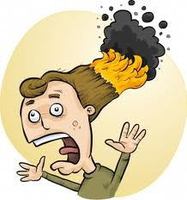Romans 12:20 - To the contrary, "if your enemy is hungry, feed him; if he is
thirsty, give him something to drink; for by doing so you will heap burning
coals on his head."
thirsty, give him something to drink; for by doing so you will heap burning
coals on his head."
Forming questions for Romans was more difficult than the other books I've read so far, but when I read this verse, I thought it was strange that Paul would compare being charitable to one's enemy to putting burning coals upon his head. Obviously, offering sustenance to an enemy is an honorable gesture; so why would Paul say that doing this would "heap burning coals on his head?" Shouldn't it rather say something like, "Feeding your hungry enemy is like eliminating walkers that surround your close friend who happens to be in a death match against his own brother?" This makes more sense because feeding a hungry person and killing zombies both result in a saved life, but putting burning coals on someone's head only leaves a bald spot. Perhaps Paul's phrase about hot coals could be a figurative interpretation because, as we have already established in class, not 100% of the Bible's words are meant to be taken literally.
One guess is that the physical image is used to describe the emotional reaction in the enemy. As our footnote indicates, the words that Paul speaks in Romans are a direct reference to Proverbs 25:21-22. These verses are surrounded by several other proverbs that use physical images to describe emotional reactions. For example, the verse that precedes this passage in Proverbs reads, "Whoever sings songs to a heavy heart is like one who takes off a garment on a cold day." This physical picture of discomfort indicates that attempting to make a mourning person cheerful only distresses him more. Likewise, the burning coals in Romans indicate the emotional discomfort the enemy will feel when his conscience is awakened to his misconduct toward the one who is now feeding him.
Next is the idea that providing a person with heat was a way to show additional kindness. With hot tubs, hot water heaters, insulated thermoses, microwaves, heating pads, stoves, etc., it is easy to take heat for granted. During Paul's day, a person could not simply stick his Hot Pocket in the microwave and enjoy its pepperoni goodness two minutes later. He had to obtain his heat through other methods; so, in this context, it is plain to see that giving someone, especially an enemy, hot coals would be an outstanding gesture of kindness in the winter or when it was time to prepare food.
Finally, "heaping burning coals" on an enemy's head could be a figurative expression of divine vengeance. After a person has done all that he can to make the enemy think favorably of him, yet the enemy still refuses to reconcile, then the burning coals of God's wrath are heaped upon his head. In other words, by this passage Paul is instructing his readers to be charitable to their enemies and leave revenge to God.
As I was doing a Google Image search for Romans 12:20, I happened upon this picture, which advertises a short film entitled "Romans 12:20." Then I found the trailer, which can be watched below, and became aware that the theme of this short film is revenge. You can watch the whole film, which is about twenty-seven minutes in length, by visiting this site and clicking "Play Movie."
Next is the idea that providing a person with heat was a way to show additional kindness. With hot tubs, hot water heaters, insulated thermoses, microwaves, heating pads, stoves, etc., it is easy to take heat for granted. During Paul's day, a person could not simply stick his Hot Pocket in the microwave and enjoy its pepperoni goodness two minutes later. He had to obtain his heat through other methods; so, in this context, it is plain to see that giving someone, especially an enemy, hot coals would be an outstanding gesture of kindness in the winter or when it was time to prepare food.
Finally, "heaping burning coals" on an enemy's head could be a figurative expression of divine vengeance. After a person has done all that he can to make the enemy think favorably of him, yet the enemy still refuses to reconcile, then the burning coals of God's wrath are heaped upon his head. In other words, by this passage Paul is instructing his readers to be charitable to their enemies and leave revenge to God.
As I was doing a Google Image search for Romans 12:20, I happened upon this picture, which advertises a short film entitled "Romans 12:20." Then I found the trailer, which can be watched below, and became aware that the theme of this short film is revenge. You can watch the whole film, which is about twenty-seven minutes in length, by visiting this site and clicking "Play Movie."
In the end, I think the answer is probably one of the first two theories. Enough evidence for a specific resolution is never given, and any answer is simply speculation. I do prefer the first option, though, because it sort of implies the "kill them with kindness" cliché. However, Paul never explicitly states that this was his intention.


 RSS Feed
RSS Feed